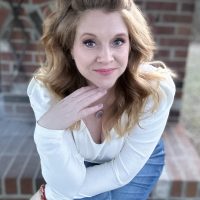View this post on Instagram
It was a beautiful fall day, and my Yorkie snored softly beside me; I felt perfectly content.
The crisp air and the gentle rustling of leaves brought a sense of calm, grounding me in the moment. Then, a notification interrupted the peace—a text message appeared on my screen. As I glanced at the first few lines, my heart sank.
“Dear Kristina,”
The peacefulness of the moment slipped away as I stared at the screen. The message felt cold and distant, written more like a formal letter from a colleague than something from a friend. It wasn’t just the words—it was the tone, the detachment.
This was someone I had once felt close to, yet here I was, reading a message that felt like a business memo. At that moment, I couldn’t deny it anymore. The disconnection I had been feeling for months, the one I kept pushing aside, had reached a point of no return.
The text came a few months after making one of the hardest decisions of my life. You see, a year ago, I decided I wanted to build a community for women healing trauma. Having childhood trauma makes relationships more difficult, so as I began to heal and learn how to create healthier dynamics, I knew I wanted to help other women do the same.
Leaning into my skills from my two-decade-long corporate career, I created everything for this community—from marketing materials to launch plans, even building the community platform from scratch. I did almost all of it alone.
I kept telling myself that it didn’t matter how much the other women contributed as long as we were moving toward the same vision. But deep down, I couldn’t shake the feeling of being weighed down by resentment and exhaustion.
Eventually, I tried to communicate my feelings to the best of my ability and explain how the imbalance in our efforts affected me. It felt like school all over again—me, the overachiever, doing all the work while everyone else got the credit. The old wounds of feeling unappreciated resurfaced, and as my trauma response kicked in, I found myself shutting down, pulling away, and retreating into familiar patterns of freeze and flight.
The irony was hard to ignore.
These were women who deeply understood trauma—we were all committed to helping other women heal from it. Yet, within our small group, it felt like they weren’t making any real effort to foster open communication or maintain a healthy business partnership.
The disconnect was unsettling. How could they talk about creating healthy relationships in our community when they weren’t practicing those same principles with the people building it alongside them? It felt like a contradiction that I couldn’t reconcile. My heart ached constantly.
By the start of this summer, everything had shifted. I felt completely alone, doing the heavy lifting while getting little in return. The community was not going the way I had envisioned. I sat with my grief, wondering why I couldn’t make this work, feeling like I had failed (again).
Eventually, I made the heartbreaking decision to step away from the community I had dreamt of, built, and nurtured. I told the women I needed to take time to focus on my health and other projects. It was like walking away from something I had poured my soul into, but I knew I had to. I hoped for understanding, some compassion even, from my friends turned business partners. Instead, I was met with silence, coldness, and even a touch of hostility. I had handed my baby over to people who now felt like strangers.
And then came that text—”Dear Kristina…”—as if we had never been close, as if everything we had shared meant nothing. It was the final blow, the moment that confirmed what I had been trying so hard to deny: that these friendships weren’t what I thought they were.
“Were they ever real friends?” I thought to myself.
The devastation was profound. I had hoped to stay involved, thinking I could keep a minimal connection, but the more I tried, the clearer it became that my presence wasn’t welcome. I felt like a stranger in a space where I had once felt safe. Anger started to build—anger at them for their coldness and anger at myself for revealing myself to them. But as time passed, that anger shifted into something else: compassion.
I realized that I had misread the friendships because I wanted so badly for them to be something they weren’t. I was so eager for connection that I overlooked the signs, hoping they could fill a void in my life where I felt desperate for connection. But the truth is: not all friendships are meant to be because sometimes we see them through rose-colored glasses.
While I do think these friendships were true at one point, I now realize I was settling.
This experience has taught me that healing, especially from trauma, is messy. It doesn’t come easily, and it certainly doesn’t come without heartbreak. Learning how to build healthy relationships is a process that takes time, and not every connection will last. But each one—even the ones that fall apart—brings a lesson. And in this case, the lesson was about learning to trust myself, even when others let me down.
Healing isn’t about getting it right every time—it’s about embracing the lessons along the way and taking a step forward every day so we can keep finding more of ourselves.
~

 Share on bsky
Share on bsky






Read 3 comments and reply